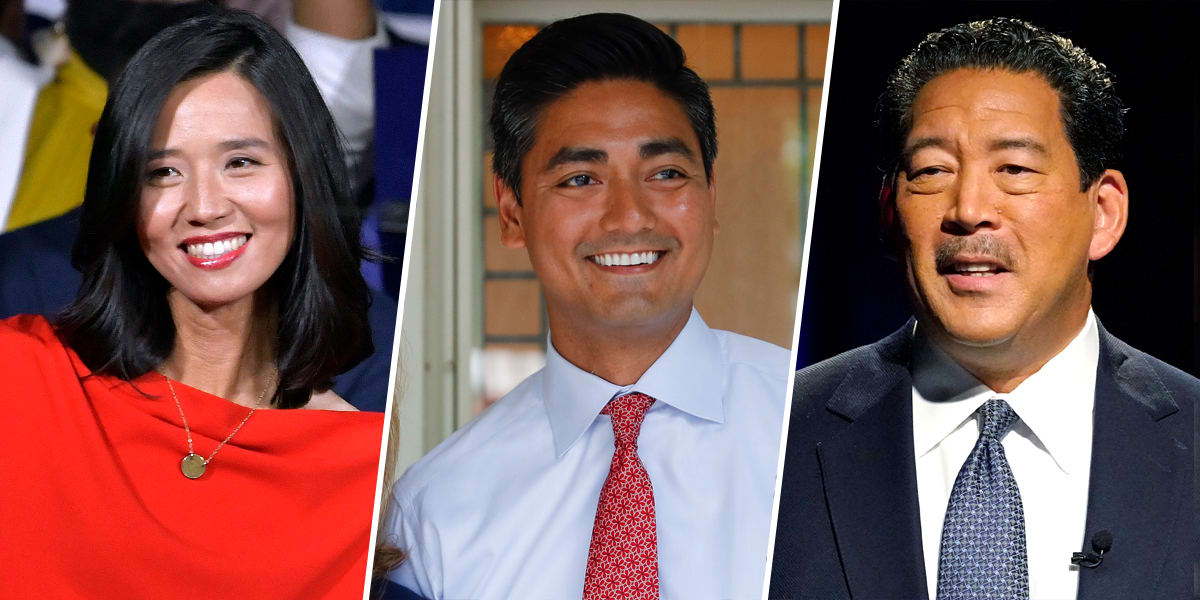
Early in Aftab Pureval’s political career, a peer gave him a word of warning.
“‘Brown guy named Aftab, that’s gonna be tough,’” recalled Pureval, now the mayor-elect of Cincinnati.
In the Midwest, Asian faces are scarcer than on the coasts, and South Asian mayors are almost unheard of. But Pureval, who is of Indian and Tibetan descent, doesn’t take issue with what he was told — in fact, he recognized the truth in it.
“The conventional wisdom was that you had to have an Irish name or a well-known name to run,” he told NBC Asian America.
Cincinnati was one of three cities that elected their first mayors of Asian descent on Tuesday: Boston elected Michelle Wu, and Seattle chose Bruce Harrell. Experts say the wave reflects the emergence of a generation of Asian Americans, who are largely children of immigrants, better poised than their predecessors to become agents in the political process, as well as proof that the stereotype of Asian Americans as lacking the necessary leadership qualities has begun to dissolve.
Generational shifts
“What you’re seeing now is the aging of the second generation, those who are the children of immigrants, and they form the backbone of most of these mayoral candidates,” Karthick Ramakrishnan, founder and director of the policy research nonprofit group AAPI Data, told NBC Asian America. “You’re also seeing the ‘graduation,’ if you will, of Asian American candidates who run for various local offices … and then proceeding on the foundations that they’ve built.”
The racial group hasn’t historically found much success in mayoral races, with just six Asian Americans currently leading the 100 largest cities. Most of them are concentrated in California and Texas. But for Asian Americans, a group overwhelmingly made up of immigrants and their children, political participation has historically come with significant hurdles, said Pawan Dhingra, professor of American studies at Amherst College.
For members of the immigrant generation, navigating their new environments took precedence over politics, experts said. Those who actually did run in years past were often from the “1.5 generation,” those who came to the U.S. before or during their early teens, Ramakrishnan added. Politically active immigrants were more likely to be those who did well in their new country, and were able to more quickly adapt to the local context of American society and understand the political system.
Though they face unique challenges of their own, those from the second generation, like Wu and Pureval, often do not carry the same burdens as their parents and are more likely to feel “a sense of a natural claim on the country,” Dhingra said.
“If their parents have established a home and jobs and some economic grounding, then they have the ability to be thinking outside of their own immediate needs, and how to serve the community through politics,” he explained.
Experts also say the new wave could be evidence of a decline in Asian American stereotypes, in part abetted by the advocacy and strength many demonstrated amid the anti-Asian attacks during the pandemic. For decades, Asian Americans have been typecast as workers who put their heads down but who lacked the proper traits to lead. But Dhingra said it’s an incorrect perception that’s been proven wrong.
“I think the anti-Asian racism motivated some Asian Americans to run for office but it also gave more of a platform for Asian American voices to be heard,” Dhingra said. “That is partly why people can see us as possible leaders. … We were the ones in the media telling our stories and pushing back. We weren’t being spoken for. We were speaking for ourselves.”
Demographic shifts
A more engaged Asian American population came to the polls in these cities, experts said, and candidates catered toward the growing pockets of underrepresented minorities in their constituency.
In Boston, Asians increased from 55,235 in 2010 to around 67,182, or 9.7 percent of the population, in 2020. They number over 115,000 in Seattle, making up 15.4 percent of the population.
Despite a historical presence and dramatic growth in recent years, not much has been done in the past to engage AAPI voters specifically, said Madalene Mielke, president and CEO of the Asian Pacific American Institute for Congressional Studies.
“People would always say, ‘You’re too small for us to count,’” she said. “‘We don’t poll you, we just don’t know how to talk to you.’ We’ve always had political influence, it’s just that no one bothered to actually talk to us and care.”
Wu brought the conversations to Asians in Boston, offering campaign materials in languages other than English and mobilizing community activists, experts said. And for Harrell, his focus on kitchen table issues drew Seattle communities to him.
Even in Cincinnati, where the Asian population sits around 2.2 percent, an Indian-Tibetan candidate managed to prevail. Pureval’s win was a result of his track record in local government, said Varun Nikore, president of AAPI Victory Alliance.
“If we can get engaged at the very local level, that’s how you can continue the momentum,” he said.
While there’s no concrete answer to what has pushed Asian Americans into a new era of political activity, Nikore says nearly two years of anti-Asian hate and harmful rhetoric from former President Donald Trump played a part. But beyond that, there’s a desire to get back to normal after Covid’s disproportionate toll on Asian-owned businesses and multigenerational families.
“This is a really monumental moment for the constituency,” Mielke said.
Wu, the daughter of Taiwanese immigrants, ushered in a new era, putting an end to Boston’s 200-year streak of electing only white men. The progressive favorite performed better across all racial groups, including with Asians, compared to her opponent, Annissa Essaibi-George. About 63 percent of Asian Americans said they supported Wu in contrast to the 11 percent for Essaibi-George, according to a WBUR poll released weeks before the election. But Wu’s win holds particular significance for Asian American women, a group severely underrepresented in the political sphere.
Diana Hwang, Founder and Executive of the Asian American Women’s Political Initiative (AAWPI), said Wu, who’s been outspoken about her upbringing and leadership style, is shifting the lens through which people see leadership.
“She has also shown us that you can do it differently … what we understand to be political leaders, they’re often white, they’re male, they’re loud,” Hwang said. “She will even say ‘I was none of those things.’”
Only a handful of Asian American women have ever served as mayors and, when looking at statewide elected executive offices, just three of the 95 women are Asian American. To earn the support of those in Boston, Wu had to embed herself in the community for years, Hwang said. She has served as a city councilor since 2014, making history two years later as the first Asian American to serve as its president.
Sung Yeon Choimorrow, executive director of the National Asian Pacific American Women’s Forum, said that such efforts aren’t always expected of men, however. While women in general confront double standards, there’s an added layer of expectation when it comes to women of color.
“Not only do we have to prove qualification in a way that white men don’t, but we have to work to bust stereotypes about Asian American women, which often assumes that we don’t make good leaders because we’re quiet, docile and more of followers than leaders. Or the opposite where our assertiveness is seen purely as aggression,” she said.
Now that Wu is at the helm, Hwang said she’s optimistic that her leadership could help change the face of American politics and inspire more Asian American women and girls to get involved.
The role of identity
Pureval’s win in a city with such a small Asian population signifies a different kind of shift, experts say. Asian candidates are able to win over largely non-Asian populations.
“I think this is where Asian Americans have the ability to say ‘I am a leader, regardless of who I lead,’” Mielke said. “That’s part of educating America that leadership doesn’t come in a white, male package all the time.”
Identity for Pureval is what brought him into politics in the first place. His mother was a refugee from Tibet in India, where she met his father. Growing up in a small, conservative Ohio town, his political awareness began with his mom.
“At an early age, I understood the importance of government stability and government effectiveness almost implicitly because of her story,” he said.
His entrance into politics came with some skepticism from his community, he said, and he felt at times that he had to assuage people’s fears about his identity. In a political ad, he even had a cartoon duck quack his name, which he said was meant to be reminiscent of the Aflac commercial.
Slowly but surely, he’s seen change in the way his identity and his name are viewed. It’s gone from liability to strength, he said. He hopes the next generation of Asian American leaders don’t have to work as hard to bridge that divide.
“Because of Michelle Wu’s success, because of the success of so many other API’s around the country, not just this cycle, but in previous cycles, the people who have blazed the path for me, I’m hoping that a future generation of API’s won’t have to deal with that,” he said.
But while Wu and Pureval earned overwhelming support from the Asian communities, Harrell, who’s mixed race and is the first Asian and second Black American to be elected mayor of Seattle, has received mixed responses from his own community.
“The community, I would say, is pretty divided,” Alisa Lee, program manager of Washington-based nonprofit Asian Pacific Islander Americans for Civic Empowerment C4, or APACE C4, said. “He certainly has a base here. But there have been a lot of things that have come up where we questioned if he’d really be the kind of person that we want to represent us.”
Harrell, who was favored by moderates, ran a campaign focused on bolstering law enforcement and keeping parks clear of homeless tent encampments, instead of increasing shelter space. Rick Polintan, president of APACE C4, said that as attacks on Asian Americans rose during the pandemic, differing opinions on how to ensure safety, among other issues, also emerged. He said that the community has not benefited from law enforcement while confronting pandemic-related violence, nor have police forces been held accountable.
“If we’re going to be relying on the same systems to protect us that haven’t been protecting us, and that’s Mr. Harrell’s position, it just sort of makes us think he’s not necessarily listening,” Lee said.
The Seattle race, Ramakrishnan said, proves that common identity isn’t a guarantee for community support. But the rift could also signal a “maturation of our politics where you can have disagreements that are sometimes intense disagreements within Asian American community,” he said.
While Asian American candidates often must demonstrate their Americanness in a way others do not, a diversity of opinions and different political playbooks can be a meaningful sign, Dhingra said. Heterogeneity shows candidates are being taken seriously for their platforms and their values, not just their identity.
“It allows us to be seen as the political candidates that we’re trying to be seen as, whether it be centrist or progressive,” Dhingra said.
Source: | This article originally belongs to Nbcnews.com










